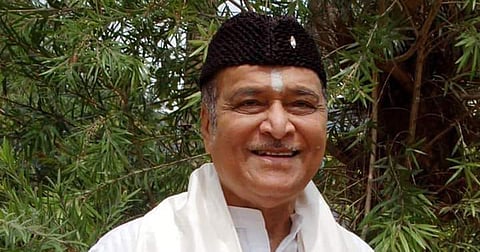
- Home
- Live Blog
- Breaking News
- Top Headlines
- Cities
- NE News
- Sentinel Media
- Sports
- Education
- Jobs

Bhupen Hazarika, whose birth centenary celebrations begin today, is undoubtedly the most recognizable Assamese of all time. A multi-faceted genius, he had, in his lifetime itself, become a living legend through his inimitable creativity in various fields. Born on this day at Sadiya in 1926, exactly one hundred years after the British had occupied Assam, he was a lyricist, a poet, a singer, a composer, a musician, a filmmaker, an actor, a journalist, a great broadcaster, a great scholar, a great thinker, and a visionary who had also made forays into politics and served as a Member of the Assam Legislative Assembly. His lyrics and songs are different from what others compose and sing. He talks about humanity, about the toiling labourer like the fireman of a railway engine or a palanquin bearer, about the glory of India, about building a casteless society where there is no place for merchants of religion, about India’s security, about the numerous problems faced by Assam including the issue of infiltration, about the wronged and the exploited, and so on. He had written and sung his first song when he was hardly ten, and at fourteen, in his second song, he spoke about breaking barriers of discrimination and turning India into a paradise of love and equality. While most people generally look only at the singer in him, the fact remains that Bhupen Hazarika was also a great filmmaker and journalist. His films are different in that those reflected the society with strong criticism. ‘Era Bator Sur’, an autobiographical film, stands alongside Satyajit Ray’s ‘Pather Pachali’ in terms of story and treatment. ‘Lotighoti’, on the other hand, is the first and still the only satire on Indian cinema. ‘Chikmik Bijuli’ was about Guwahati growing up from a town to a city and precedes two important Bengali films – ‘Mahanagar’ and ‘Calcutta 71’ – in terms of talking about a city. Bhupen Hazarika also stood out as a journalist. He was editor of ‘Aamaar Pratinidhi’, a monthly magazine, for 16 long years, and apart from his travelogues and interviews, his editorials were the strongest as far as criticizing the policies of the government was concerned. As a Member of the Assam Legislative Assembly, he is remembered for his contribution towards the establishment of Jyoti Chitraban, the first state-owned film studio in the country. A humanist of the highest order, his songs have documented numerous ups and downs of the human race over a period of seventy years when he was most active. The first genuine global citizen of India, Bhupen Hazarika, however, was at the core a great patriot on one hand and a hardcore Assamese on the other.